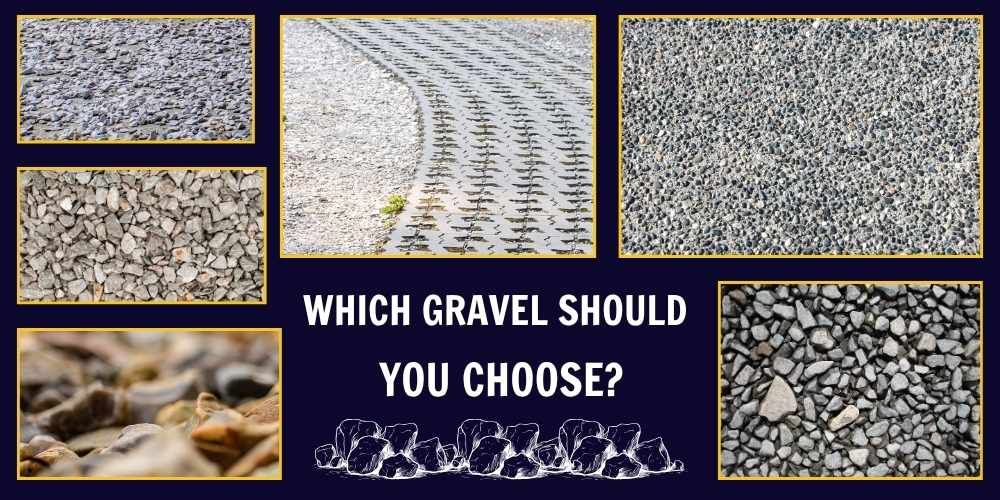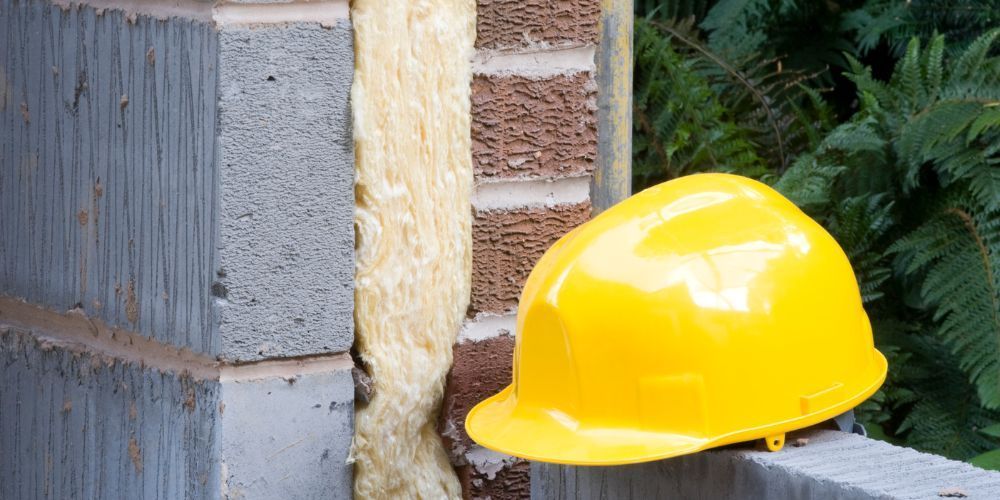Concrete vs Asphalt Driveways: What to Choose?
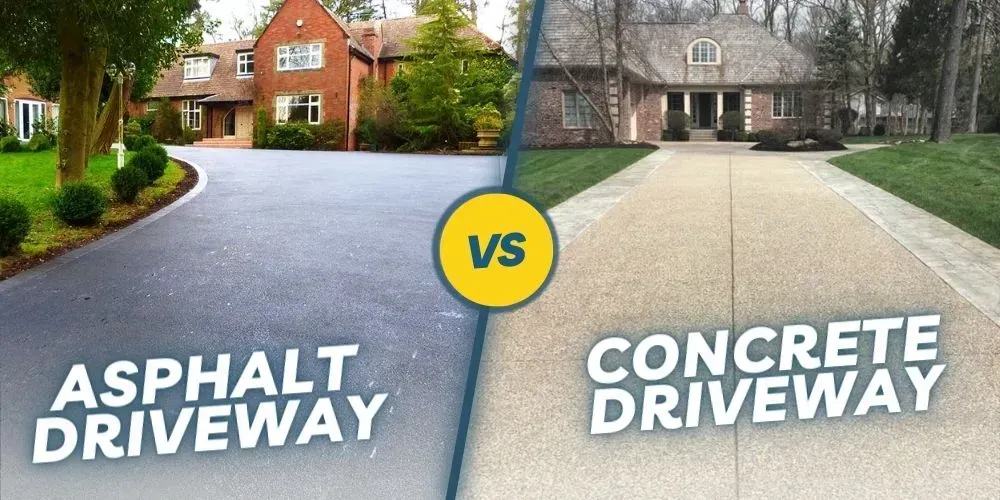
The driveway plays a significant role in enhancing the curb appeal and functionality of your home. It is essential to choose a material that aligns with your requirements and enhances the overall appeal of your home. Concrete and asphalt are the two primary options available for driveway construction, each with its own set of characteristics and benefits, and making an informed decision is crucial.

Concrete Driveways
Concrete driveways are known for their durability and longevity. They offer a solid and stable surface that can withstand heavy loads and harsh weather conditions. Concrete driveways are highly versatile and can be customized with various finishes, colors, and patterns, allowing homeowners to achieve the desired aesthetic appeal. Additionally, concrete driveways require minimal maintenance, making them a convenient choice for many homeowners.
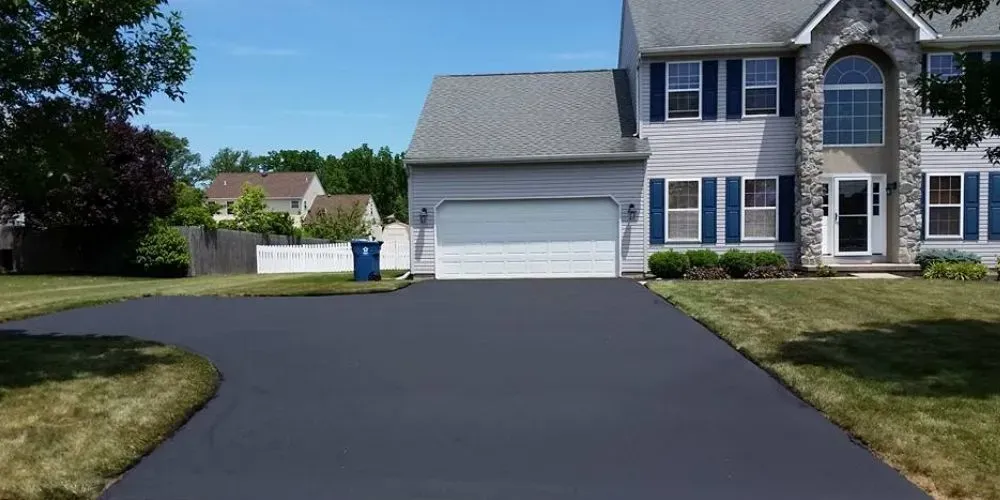
Asphalt Driveways
Asphalt driveways are known for their affordability and flexibility. They are constructed using a mixture of aggregates and bitumen, creating a smooth and flexible surface. Asphalt driveways are relatively quick to install, and they offer excellent resistance to freeze-thaw cycles. While they require more frequent maintenance compared to concrete driveways, proper care can significantly extend their lifespan.
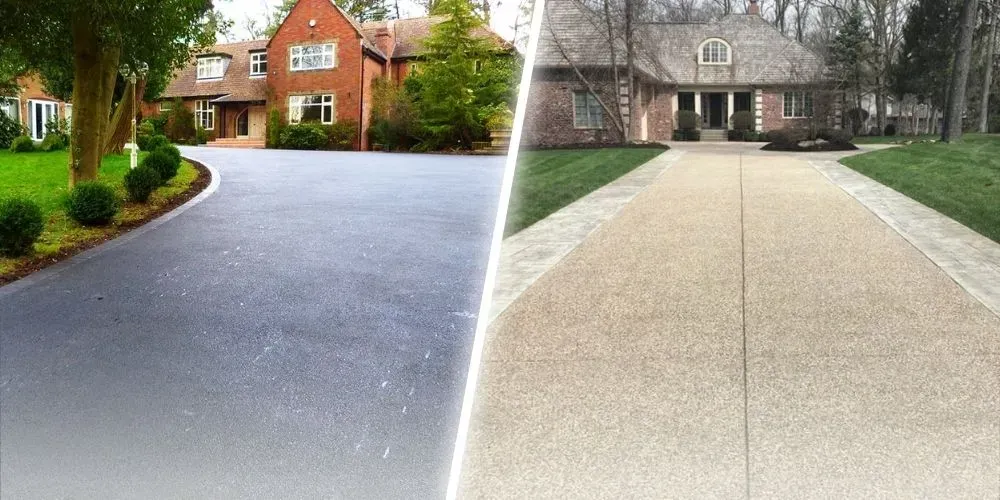
Difference Between Asphalt and Concrete Driveways
Concrete driveways offer superior durability and can last over 30 years with regular maintenance and occasional repairs. On the other hand, while asphalt driveways are less durable, they can still provide a lasting solution with proper care. Consider your long-term needs and maintenance preferences when choosing between the two options.
Durability and Longevity
Concrete driveways are renowned for their exceptional durability and longevity. They can withstand heavy loads and are resistant to cracking, making them ideal for areas with high traffic or heavy vehicles. Concrete driveways can last up to 30 years or more when properly maintained.
On the other hand, asphalt driveways are slightly less durable. They are prone to cracking and require more frequent repairs compared to concrete. However, with proper maintenance, such as regular seal coating and crack filling, an asphalt driveway can still last for 20 years or more.
Maintenance and Repair
Concrete driveways generally require less maintenance than their asphalt counterparts. They are resistant to stains and can be easily cleaned with soap and water. Regular sealing every few years helps protect the concrete surface and maintain its appearance.
Asphalt driveways, on the other hand, need more frequent maintenance to keep them in good condition. They should be seal coated every two to three years to protect against moisture and harmful UV rays. Additionally, asphalt driveways require occasional repairs for cracks and potholes.
Aesthetics
When it comes to aesthetics, concrete driveways offer a range of design options. They can be stamped, stained, or textured to mimic the appearance of various materials such as brick or stone. Concrete driveways can be customized to complement the architectural style of your home, providing a visually appealing entrance.
Asphalt driveways have a more traditional and uniform appearance. While they lack the versatility of concrete in terms of design options, they still offer a neat and clean look that can enhance the curb appeal of your property.
Climate Adaptability
Climate plays a significant role in determining the performance of driveways. Concrete driveways are highly resistant to temperature fluctuations, making them suitable for both hot and cold climates. They can withstand freezing and thawing without significant damage.
Asphalt driveways are more susceptible to temperature changes. In extremely hot conditions, the surface softens, causing depressions or marks from heavy objects. In colder climates, asphalt can contract and crack due to freezing temperatures.
Installation Process
The installation process for concrete and asphalt driveways differs significantly. Concrete driveways require careful planning and preparation, involving excavation, framework installation, and pouring of the concrete mixture. The curing process takes time, usually a few days before it can handle vehicle traffic.
Asphalt driveways are relatively quick to install. After the initial site preparation and leveling, a layer of hot asphalt is applied and compacted. The driveway can be ready for use within a day or two after installation.
Cost Comparison
The cost of installing a driveway is an important factor for many homeowners. Concrete driveways tend to have higher upfront costs due to the materials and labor involved in their installation. However, they offer long-term durability and require less maintenance, which can result in lower overall costs over time.
Asphalt driveways have lower initial costs compared to concrete. The materials used in asphalt are generally less expensive, and the installation process is quicker. However, they require more frequent maintenance and repairs, which can increase long-term costs.
Environmental Impact
Concern for the environment is becoming increasingly important in construction decisions. Concrete driveways are considered more environmentally friendly compared to asphalt. Concrete is a recyclable material, and the production process generates fewer greenhouse gas emissions. Additionally, its light color helps reduce the urban heat island effect by reflecting sunlight.
Asphalt driveways, on the other hand, have a higher carbon footprint. The production of asphalt involves the extraction and refining of petroleum, which contributes to environmental pollution. However, advancements in recycling technologies have allowed for the reuse of old asphalt, reducing waste.
Noise Levels
The noise generated by vehicles traveling on the driveway can be a concern for homeowners. Concrete driveways tend to produce less noise compared to asphalt driveways. The rigid surface of concrete helps dampen the sound, resulting in a quieter environment.
Asphalt driveways, due to their flexible nature, generate more noise when vehicles drive over them. The vibrations caused by tires can create a louder sound, especially in high-traffic areas.
Safety Considerations
Safety is a critical aspect to consider when choosing a driveway material. Concrete driveways offer better skid resistance, reducing the chances of accidents, particularly in wet or icy conditions. The textured surface of concrete provides more traction for vehicles and pedestrians.
Asphalt driveways, while still providing adequate traction, are slightly less slip-resistant than concrete. However, a regular seal coating can enhance the skid resistance of an asphalt surface.
Resale Value
The choice of driveway material can also impact the resale value of your property. Concrete driveways are generally perceived as higher-end and can increase the curb appeal of a home. Potential buyers often appreciate the durability and aesthetic appeal of concrete, which contribute to a higher resale value.
Asphalt driveways, while more common, still offer a clean and presentable look. While they do not provide the same visual impact as concrete, a well-maintained asphalt driveway can still positively impact the resale value of a property.
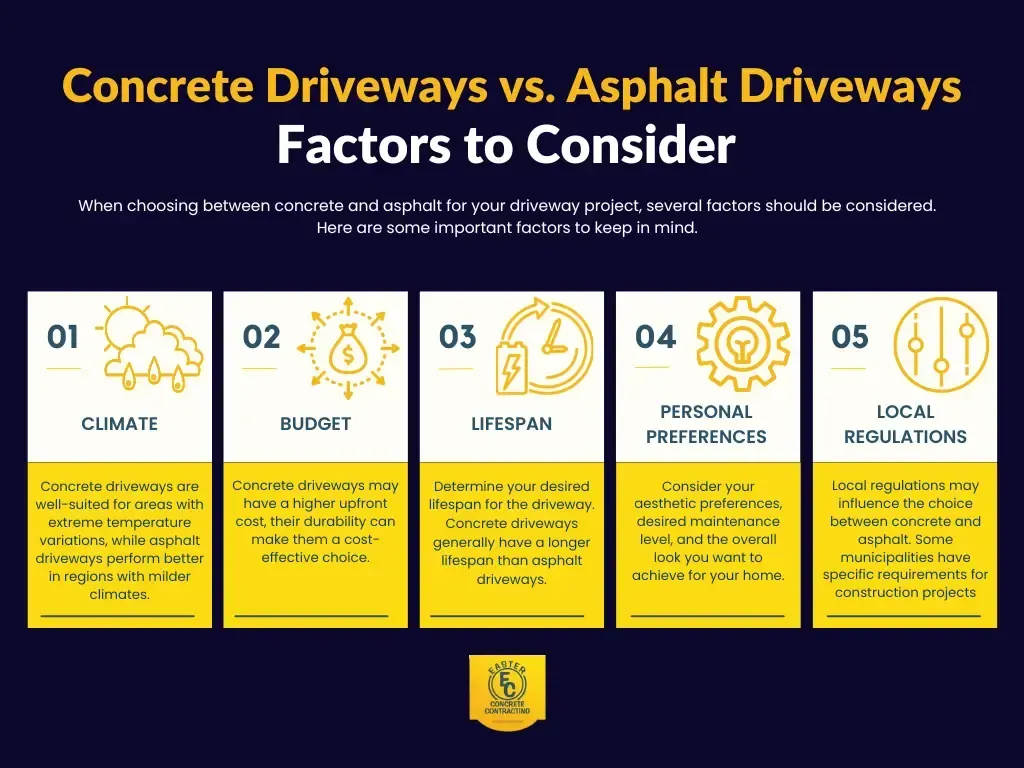
Factors to Consider When Choosing Between Concrete and Asphalt
When deciding between concrete and asphalt driveways, it's essential to consider the following factors:
Climate: Climate plays a crucial role in the longevity and performance of driveways. Concrete driveways are well-suited for areas with extreme temperature variations, while asphalt driveways perform better in regions with milder climates.
Budget: Consider your budget and long-term cost projections. While concrete driveways have a higher upfront cost, their durability can make them a cost-effective choice over time.
Lifespan: Determine your desired lifespan for the driveway. Concrete driveways generally have a longer lifespan than asphalt driveways.
Personal Preferences: Consider your aesthetic preferences, desired maintenance level, and the overall look you want to achieve for your home.
Local Regulations: Local regulations and specifications influence the choice between concrete and asphalt. Some municipalities have specific requirements for construction projects, which may impact the decision-making process.
Choosing the right driveway material for your home is an important decision that requires careful consideration. Concrete driveways offer durability, low maintenance, and customizable aesthetics, while asphalt driveways provide affordability and flexibility. By weighing the pros and cons, considering factors such as climate, budget, desired lifespan, and personal preferences, you can make an informed decision.
Easter Concrete Contracting is a team of skilled concrete driveway contractors located in San Antonio, TX. With years of experience, our dedicated professionals specialize in crafting stunning decorative concrete driveways. Our driveways not only add to the overall aesthetic appeal of your property but also exhibit exceptional durability. Get in touch with us today to share your vision, and allow us to transform it into reality using our expertise and unwavering commitment to superior craftsmanship.
Frequently Asked Questions (FAQs)



